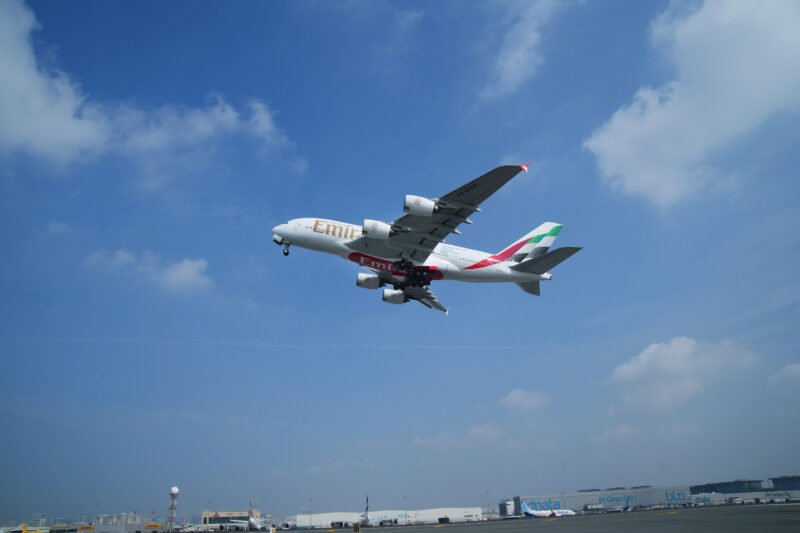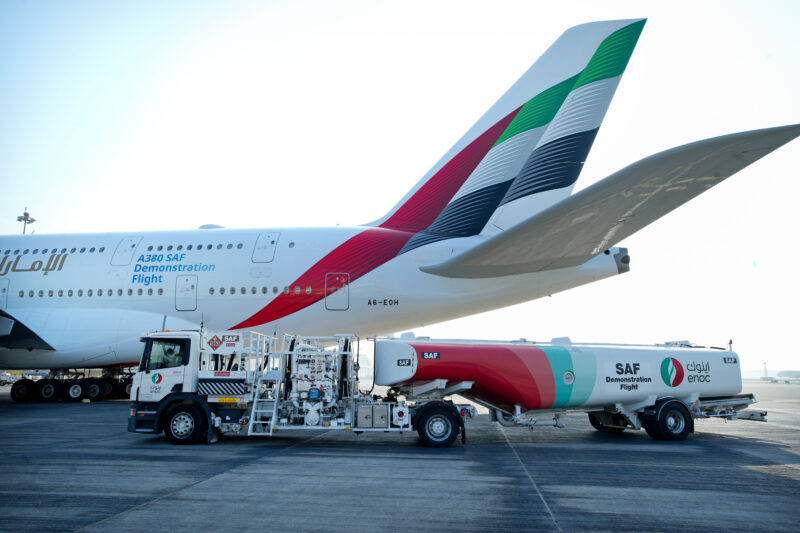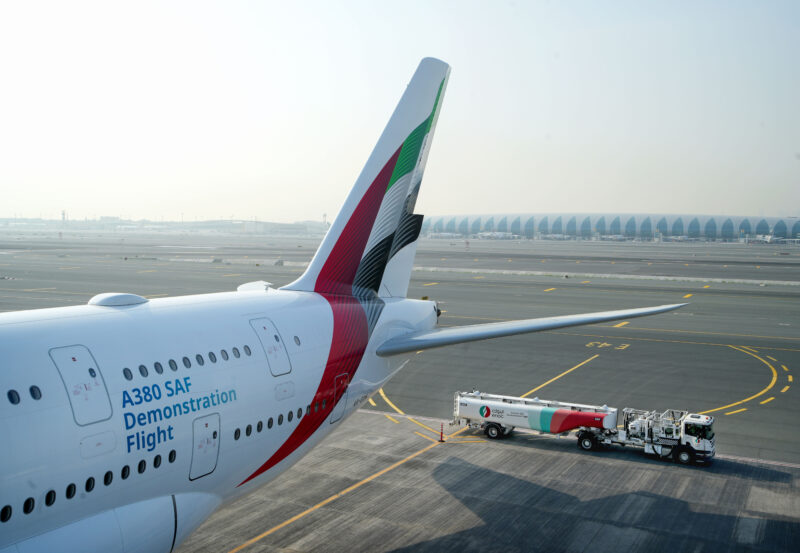We’ve seen airlines address the want of Sustainable Air Fuel (SAF), as well as trying to get their hands on supply. Emirates has gone one stage further today, demonstrating an Airbus A380 in flight – with one engine powered entirely by SAF.
The demonstration is another way of showing that SAF is a drop-in replacement for current kerosene-powered flights. It also shows that it matches jet fuel’s technical and chemical requirements while being a more sustainable alternative.
The move follows a similar demonstration flight operated by Earlier with a Boeing 777-300ER being powered by 100% SAF in one engine.
Demonstration flights like the one conducted today pave the way for future standardisation, qualification and adoption for 100% SAF flying, as governments adopt broader strategies to support the production and scale-up of SAF. The A380 demonstration flight underlines the performance and compatibility of SAF, making it a safe and reliable fuel source, and contributes to the growing body of research carried out by the industry to evaluate the beneficial effects of 100% SAF on aircraft performance.
SAF is currently capped at a 50% blend limit in engines for commercial flights.
The flight was made possible with various parties collaborating – with Airbus, Engine Alliance, Pratt & Whitney, Neste, Virent and ENOC working on the testing, technical assessments and data analysis for the flight.
The flight carried four tonnes of SAF, comprised of HEFA-SPK provided by Neste (hydro-processed esters and fatty acids synthetic paraffinic kerosene) and HDO-SAK from Virent (hydro deoxygenated synthetic aromatic kerosene). ENOC helped to secure the neat SAF comprised of HEFA-SPK and blended it with Sustainable Aviation Kerosene (SAK) at its facility in Dubai International Airport ahead of the demonstration, and also carried out into-plane services.
The 100% SAF was used in one Engine Alliance GP7200 engine, while conventional jet fuel was used in the other three engines. The PW980 auxiliary power unit (APU) from Pratt & Whitney Canada also ran on 100% SAF.
In Quotes
Adel Al Redha, Chief Operating Officer, Emirates Airline said:
“Emirates is the first passenger airline in the world to operate an A380 with 100% drop-in SAF powering one of four Engine Alliance GP7200 engines. This is another proud moment for Emirates and our partners, as we put words into action with the research into and the trialling of higher concentrations of SAF to eventually lead to industry adoption of 100% SAF flying. This marks another significant step in validating the use of SAF in one of the engines of the A380, a wide-body aircraft with four engines. The growing global demand for lower-emission jet fuel alternatives is there, and the work of producers and suppliers to commercialise SAF and make it available will be critical in the coming years to help Emirates and the wider industry advance our path to lower carbon emissions.”
Julie Kitcher, Airbus Executive Vice President Communications and Corporate Affairs commented:
“Seeing Emirates flying an A380, the world’s largest airliner, powered by an engine running on 100% Sustainable Aviation Fuels is a symbolic moment. These fuels are the most effective way to address CO2 emissions in the aviation industry today and that they are supported increasingly by the world’s leading airlines. SAF is vital to meeting the sector’s target of net-zero emissions in 2050, but needs the backing of the whole industry. At Airbus, we are working to make all our aircraft 100% SAF-capable by 2030. We’re also working with partners to grow the global SAF market in the coming years. Airbus’s purpose as a company is to pioneer sustainable aerospace for a safe and united world. Through our partnership with Emirates, we’re matching ambition with action.”
Amy Johnston, president of Engine Alliance, a 50-50 joint company between GE Aerospace and Pratt & Whitney added:
“Engine Alliance and Emirates have a strong relationship that dates back 15 years to the A380 entry into service. We are proud to power Emirates’ latest SAF demonstration flight – and share a commitment to more sustainable aviation looking forward,”
Aziz Koleilat, Vice President of Global Sales and Marketing for the Middle East, Eastern Europe, and Turkey at GE Aerospace said
“Innovation and collaboration are the keys to reaching net zero carbon emissions by 2050 as this 100% SAF demonstration flight shows. GE Aerospace congratulates Emirates on this major achievement, and we are proud to be powering industry efforts toward a more sustainable future,”
“All GE Aerospace and Engine Alliance engines can operate on approved SAF blends today and through extensive research and testing, GE Aerospace is helping lead the approval and adoption of 100% SAF in the aviation industry.”
Jonathan Wood, Vice President Commercial Management and Business Development from the Renewable Aviation business at Neste.
“Sustainable Aviation Fuel plays a crucial role in reducing the emissions of air travel, but to fully leverage its decarbonisation potential we need to enable 100% SAF use. Test flights like this Emirates A380-flight using Neste’s SAF are an important step towards 100% SAF certification and we applaud Emirates for its efforts to help pave the way forward. Neste is working closely together with partners to accelerate the availability and use of SAF and we look forward to growing the supply of SAF also to Dubai,”
Virent President and General Counsel Dave Kettner.
“Virent congratulates Emirates Airline on another successful demonstration flight using 100% sustainable aviation fuel featuring Virent’s cleaner-burning BioForm® SAK”,
“With Virent’s plant-based fuels technology, this test flight showed that 100% renewable fuel can meet current specifications and work flawlessly in today’s commercial airline engines. It’s critical that a consortium of companies, like this group, come together to bring sustainable aviation fuel into more widespread use. Virent will continue to collaborate with future-focused companies, and through this collaboration we can continue to reduce emissions and power a more fuel-efficient airline industry.”
Demonstrations are wonderful. So is compatibility. However, Supply is key.
It’s good to see technical demonstrations like this carried out – showing the state of Sustainable Air Fuel and how it can power the aircraft of today. Neste has been important to this work, as well as Virent to supply the SAF to deploy on both commercial and demonstration flights.
We also saw Rolls Royce declare their engines as 100% SAF-certified last week to add to the mix.
However, as much as the industry likes, there is a long way to go with other power source alternatives (such as Hydrogen or Electricity), so the idea of a drop-in replacement for Jet-1A is more than appealing. That and the supply constraints that SAF has, with production being mere drops – compared to the ocean of kerosene that aviation consumes.
And that SAF gap is growing, as airlines scramble for supply, as they aim for 10% SAF blend use by 2030.
Supply is going to be the real challenge for Sustainable Air Fuel as the industry moves forward with its ever-present demands as it seeks to move to Net Zero.
Welcome to Economy Class and Beyond. Your no-nonsense guide to network news, honest reviews, in-depth coverage, unique research, as well as the humour and madness I only know how to deliver.
Our Social Media pool has expanded. You can find us across most networks as @economybeyond on Twitter, Mastodon, BlueSky, Threads and Instagram!
Also, remember that we are part of the BoardingArea community, bringing you the latest frequent flyer news from around the world.


